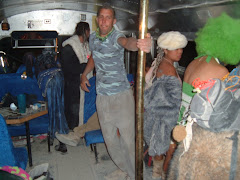Galaxy may be full of 'Earths,' alien lifeWOW!!
(CNN) -- As NASA prepares to hunt for Earth-like planets in our corner of the Milky Way galaxy, there's new buzz that "Star Trek's" vision of a universe full of life may not be that far-fetched.
Pointy-eared aliens traveling at light speed are staying firmly in science fiction, but scientists are offering fresh insights into the possible existence of inhabited worlds and intelligent civilizations in space.
There may be 100 billion Earth-like planets in the Milky Way, or one for every sun-type star in the galaxy, said Alan Boss, an astronomer with the Carnegie Institution and author of the new book "The Crowded Universe: The Search for Living Planets."
He made the prediction based on the number of "super-Earths" -- planets several times the mass of the Earth, but smaller than gas giants like Jupiter -- discovered so far circling stars outside the solar system."
OK. This is completely sweet. Think about it folks - 100,000,000,000 planets similar to Earth. If that doesn't blow your mind, and ignite your inner travel bug, then I'd have to question your humanity. That's right - your humanity.
Combine this with what we already know about our own solar system:
Liquid water on Saturn moon could support lifeWhat you have here is all the reasons there should ever need to be for a robust, science-based program geared towards exploring and ultimately LIVING on other planets, moons, etc. Fuck a trip to Cozumel! I'm going to Star 92A-J837NHG90-4!!!
Cassini spacecraft sees signs of geysers on icy Enceladus
(MSNBC) - "Scientists have found evidence that cold, Yellowstone-like geysers of water are issuing from a moon of Saturn called Enceladus, apparently fueled by liquid reservoirs that may lie just tens of yards beneath the moon's icy surface.
The surprising discovery, detailed in Friday's issue of the journal Science, could shoot Enceladus to the top of the list in the search for life elsewhere in our solar system. Scientists described it as the most important discovery in planetary science in a quarter-century.
No, I'm not kidding.
How do we do it? I'm no scientist, but it's not difficult to see at all how we do this. And by that, I mean it's impossibly difficult. Of course it won't be easy, but the plan is not exactly unheard-of: we set our minds to it, learn the science, and accomplish it.
"Yeah right, smart-ass," you're thinking. (And I am a smart-ass.) How do we find the resources to do this, the quadrillions of dollars and man-hours it would require to explore other planets in a meaningful way? Another not difficult/ impossibly difficult task: we stop wasting good time, good money, good science, and good lives on making war, and killing each other. We then take all that pent up energy, which has hitherto been so destructive, and use it to send human beings to Enceladus, possibly Mars, and few hundred years down the line, other solar systems. Don't end the military - redirect that energy! They've got a lot of good scientists anyway! As a double benefit, who knows what kind of technologies might be developed in the process?
Now, some very good-hearted and intelligent people say: "Well, we shouldn't be wasting all of our time and energy going to other planets when we've got people on our own planet who are hungry." It's a reasonable point, but the answer to that is yet another easy/difficult one: we have the technology and the capacity to feed every single individual on the planet NOW. We, as a human race, have simply chosen not to. We can do BOTH of these things - feed humanity, and explore space. They're not mutually exclusive. We just need an organized effort, on the part of all peoples, to do so. Again - easy choice/impossibly difficult in reality. But it is achievable.
Other smart and conscientious people raise a different type of objection to space exploration. It's either "We shouldn't going to other planets because we'll just mess them up"; or it's "We should get our own planet in order before investing energy checking out others."
The second one is easier. Of course we need to fix our planet. But again, fixing our planet and exploring space are are not mutually exclusive. We just need to decide, as a human race, that we want to stop pumping C02, methane, and other greenhouse gasses, switch to renewables NOW, and you know what? Humanity will probably survive the next couple of thousand years - hopefully exploring space all the while. Otherwise, just look at the trendlines for our climate these days! We may NEED to have a Plan B!
The first objection above is more difficult: "We'll just mess other planets up." On a basic level, I have to admit that there is at least some truth to this logic. All creatures leave detritus, and the more complicated the animal, the more detritus. I think it's fair to say that, thus far, humans are the most complicated animal we know about. (Squid?) But the question is, are we able, as a species, to mitigate the effect of our wastes to a level that is conscionable? And to me, the answer to that one is another easy/difficult one. And it's yes, we CAN mitigate the effects of our wastes to an ethical level - or why would I even bother calling myself an environmentalist? If the whole human waste/pollution issue is hopeless, then we truly are screwed. Humans can act irrationally, no doubt - but we don't HAVE to act irrationally. It's not the preferred mode of human thought and action.
Finally, some people are going to say: "This is just wishful thinking. It's impossible." To that I say: "Impossible for you, maybe." Human beings on planet earth currently number at least 6,000,000,000 - and some of us are some pretty smart cookies. I'm generally of the opinion that that which 6,000,000,000 people put their mind to achieving, will very likely happen. "But we'd have to unite as one!" you say. And I say, "Super! Let's do it!" Objections based on priorities hold no truck with me. What could possibly be more important the exploring the universe around us? Isn't that what we have brains for?
I'm 32 years old right now. I'd like to see the Enceladus if I live to be 80. Seriously, I'd be happy washing dishes at the Hotel Enceladus. The first step on a journey like this is always the most difficult one - and that will be ridding our human race of its psychological addiction to militarism. If we can accomplish that, I expect to be strapping on a spacesuit and packing a dishrag in about 40 years.
Let's get going.























No comments:
Post a Comment